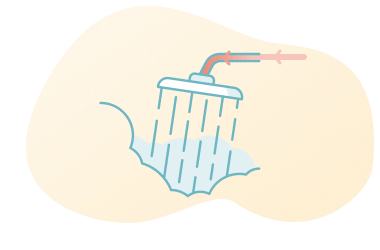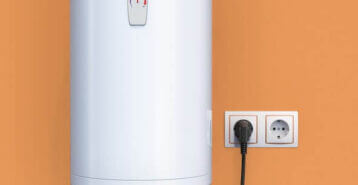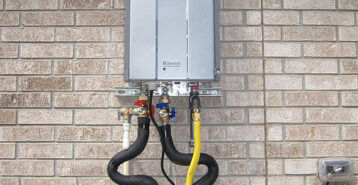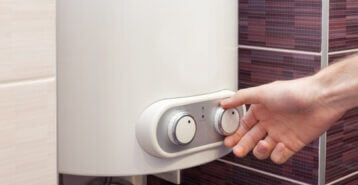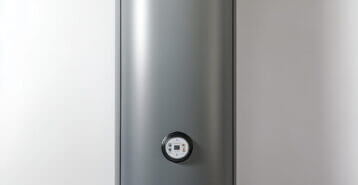Basic Cost Information for Tank Water Heaters
A tank water heater typically costs $300–$1,800+ for the unit, plus $300–$1,500 for professional installation. Total costs vary by fuel type (gas vs. electric), tank size, efficiency, and whether your home needs upgrades like new venting or piping.
Below, we’ll provide a more comprehensive cost range and what influences pricing.
General Price Range
- Low-end cost: $300–$600
- Basic models with lower efficiency and smaller capacities.
- Mid-range cost: $600–$1,000
- Better efficiency and features for many average-sized homes.
- High-end cost: $1,000–$1,800+
- High-efficiency models, larger tanks, and advanced features.
Factors Affecting Price
- Size/capacity: Common sizes include 40, 50, 75, and 80 gallons. Larger tanks typically cost more and are better suited for bigger households.
- Energy efficiency: Higher-efficiency and ENERGY STAR-rated models often cost more upfront but may save money over time.
- Brand: Premium brands such as Rheem, A.O. Smith, and Bradford White may carry higher price tags.
- Material: Stainless steel tanks usually cost more than standard steel tanks, but they may last longer.

Estimated Costs by Type
- Gas water heaters:
- Unit price: $400–$1,200
- Installation can cost more due to venting requirements.
- Electric water heaters:
- Unit price: $300–$900
- Often cheaper to install, but operating costs may be higher than gas.
- Solar water heaters:
- Unit price: $2,000–$5,000+
- Higher upfront cost, but potential energy savings and lower environmental impact.
These ranges are estimates and can vary by location, labor rates, and specific model features. To make the best decision, consider both upfront price and long-term operating costs.
Best Tank Water Heaters
When choosing the best tank water heaters, focus on reliability, efficiency, warranty length, and recovery rate (how quickly the tank reheats). A quality tank model can provide steady hot water for larger households while helping manage energy use with better insulation and modern controls.
Pros and Cons of Tank Water Heaters
Pros
- Reliable & simple: Tank water heaters use a straightforward design that’s widely understood, making repairs and parts easier to handle.
- Lower installation cost: Compared with tankless models, tank heaters often cost less to install because they typically require fewer upgrades and less complex setup.
- Variety of options: Tank models come in a wide range of capacities, fuel types, and feature sets to match different homes and budgets.
Learn about the parts and process of tank water heaters using our illustration below.
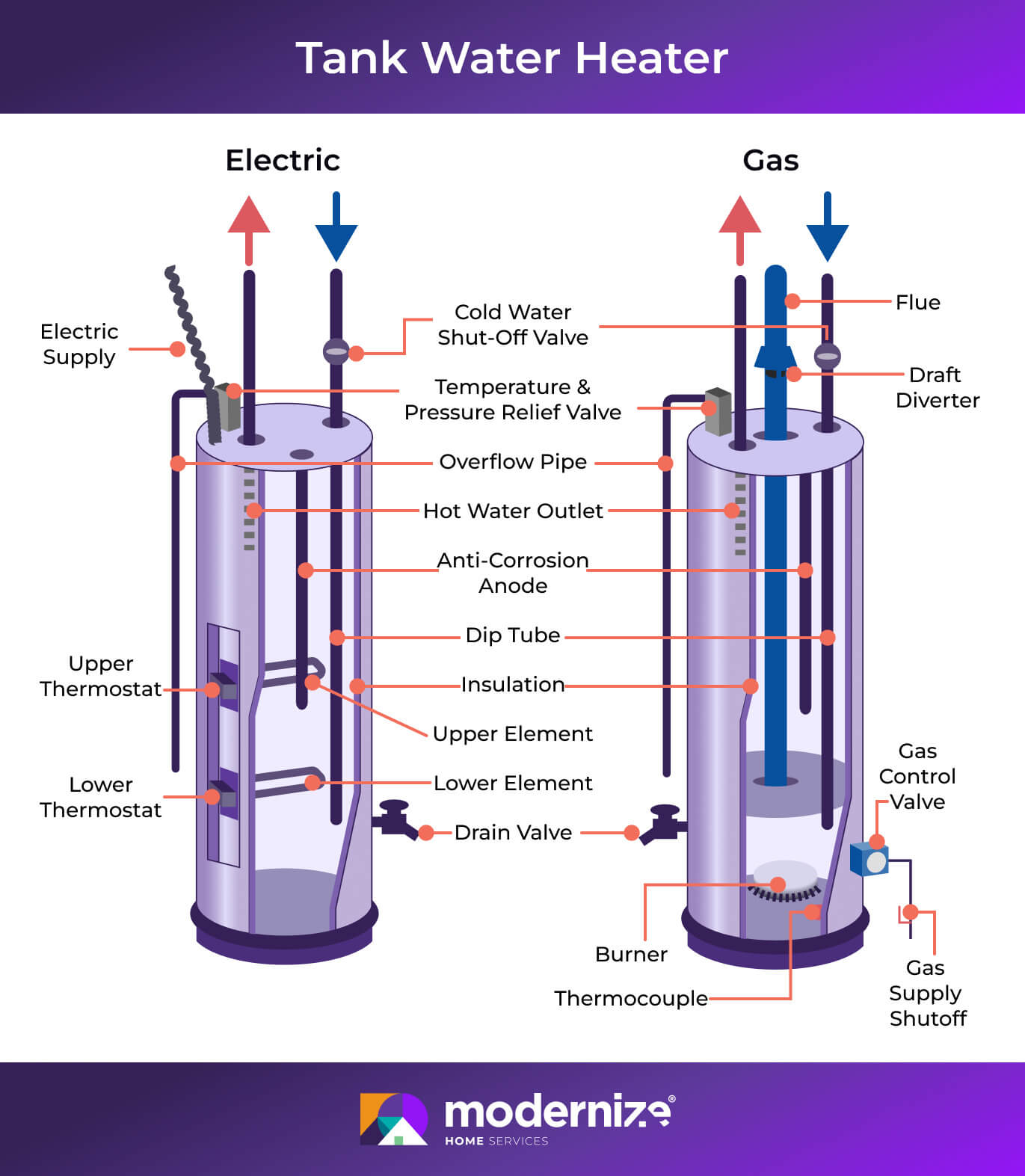
Cons
- Higher operational cost: Tank systems maintain water temperature 24/7, which can increase energy use compared to on-demand heating.
- Limited hot water supply: Once the tank is depleted, you may need to wait for it to reheat — especially during high-demand times.
- Space & heat-up time: Tank heaters take up more room and typically require more time to heat water compared to tankless systems.
Comprehensive Cost Breakdown of Tank Water Heaters
Purchase Price
- Tank capacity and energy source:
- Small capacity (30–40 gallons): Ideal for 1–2 people.
- Electric: $300–$600
- Gas: $400–$800
- Medium capacity (50–55 gallons): Suitable for 3–4 people.
- Electric: $400–$900
- Gas: $500–$1,000
- Large capacity (75+ gallons): Best for 5+ people.
- Electric: $700–$1,800
- Gas: $1,000–$1,600
- Small capacity (30–40 gallons): Ideal for 1–2 people.
- Solar water heaters: Often $2,000–$5,000 (higher upfront cost, potential long-term savings).
Installation Costs
- Professional installation vs. DIY:
- Professional installation: Commonly $300–$1,500, depending on complexity, location, and code requirements.
- DIY installation: Lower cost but higher risk. Only appropriate for experienced homeowners who can meet local code and safety requirements.
- Possible add-ons and upgrades:
- New piping, fittings, shutoff valves, drip pan, or venting (for gas models) may add $100–$300+.
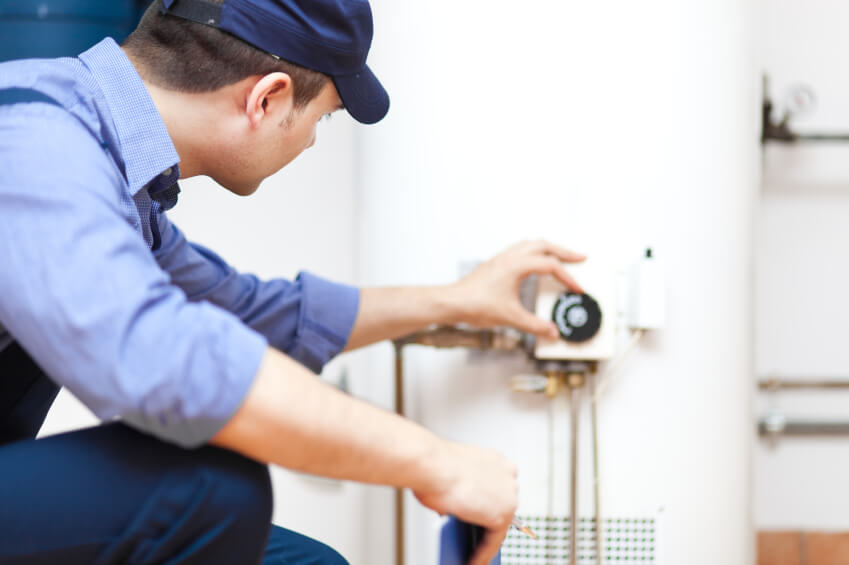
Operating Costs
- Energy consumption:
- Gas: roughly $200–$400/year
- Electric: roughly $400–$600/year
- Maintenance:
- Flushing the tank and checking the anode rod may cost $20–$200/year, depending on DIY vs. professional service.
Replacement and Longevity
- Lifespan: Many tank water heaters last 10–15 years with proper maintenance.
- Replacement and disposal: Replacing a unit includes the cost of a new heater and installation. Disposal fees for the old unit may apply (often $50–$100).
Understanding these cost categories helps you compare models more accurately by weighing upfront price against operating costs and expected lifespan.
Making Cost-Effective Decisions for Tank Water Heaters
Choosing the Right Size and Type for Your Needs
Choosing the right size and fuel type helps avoid overspending while ensuring you have enough hot water.
- Assess household demand: Larger households usually need higher gallon capacity and faster recovery rates.
- Choose the energy source: Gas often costs less to run but can cost more to install. Electric is often cheaper to install but may cost more to operate.
- Plan for space: Make sure you have enough room for the unit (and required clearance), especially for larger tanks.

Tips for Reducing Operating Costs
- Add insulation: An insulation blanket (where appropriate) and insulated hot water pipes can reduce heat loss.
- Lower the temperature setting: Setting the thermostat to around 120°F can reduce energy costs while helping prevent scalding.
- Keep up with maintenance: Flushing sediment and checking the anode rod can help maintain efficiency and extend lifespan.
Rebates and Tax Incentives
- Rebates: Some utility companies and local programs offer rebates for energy-efficient water heaters.
- Tax incentives: Certain high-efficiency models may qualify for federal or state incentives depending on current programs.
By selecting the right tank size and fuel type, and using cost-saving strategies, you can enjoy reliable hot water while keeping long-term costs under control.
Compare top-rated plumbing pros in your area.
Read real homeowner reviews, explore qualifications, and view promotions. Modernize makes it easy to browse professionals and find one that will be perfect for your project.
